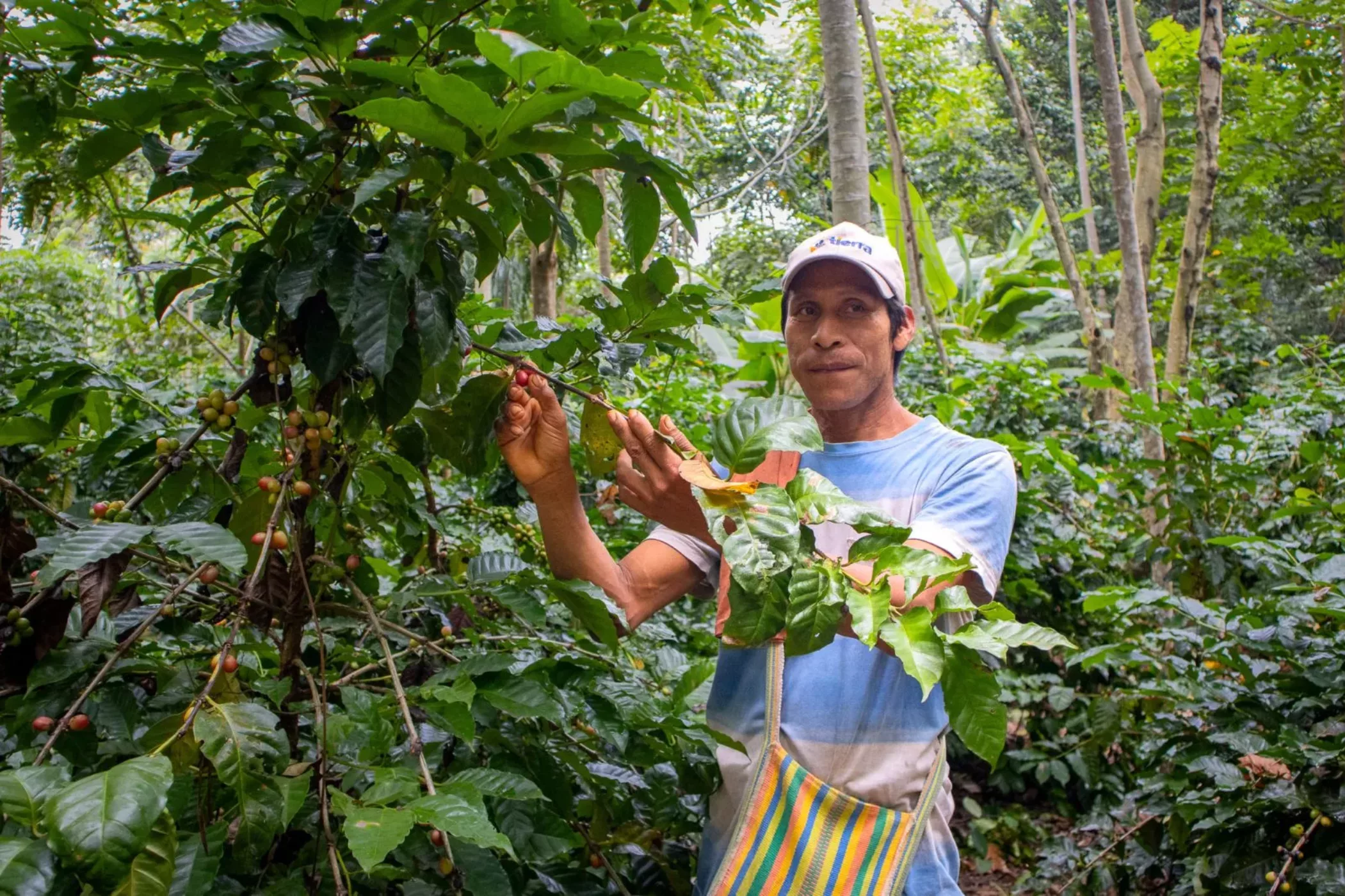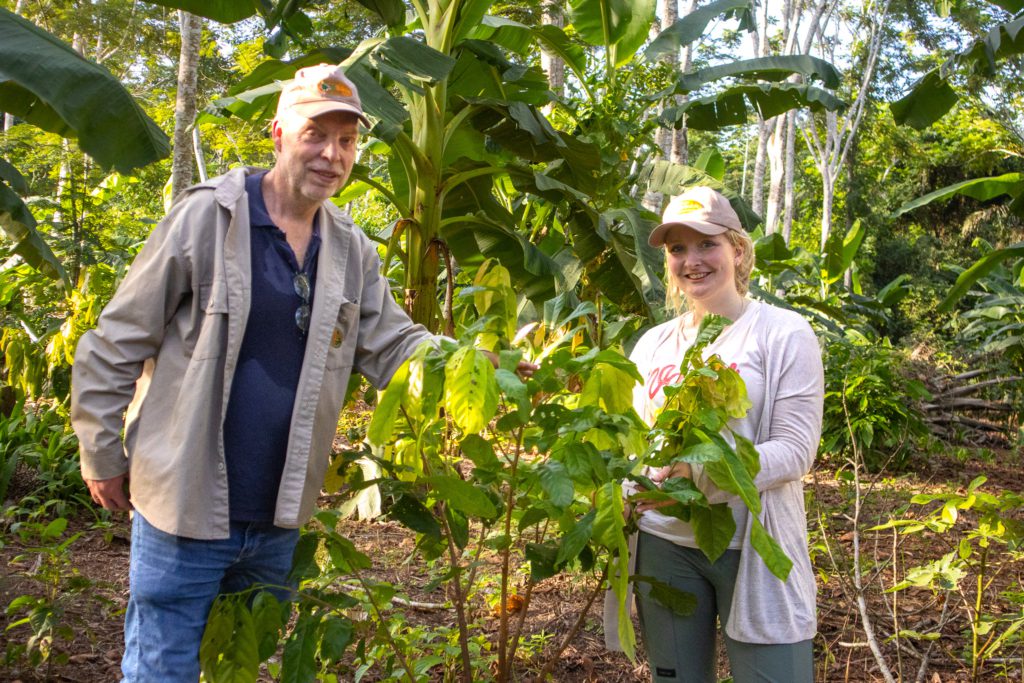How we contribute to the preservation of the Amazon, together with Bolivian farmers
05 June 2024

05 June 2024
Bolivian farmers help the transition to sustainable agroforestry, so they no longer have to cut down trees in favor of agriculture or animal husbandry. This is the ArBolivia Project, to which Trees for All and Sicirec dedicate themselves. And it works: via the project, some 2,000 Bolivian farmers plant trees combined with coffee and cocoa! In May 2024 we visited a number of them in order to see how they contribute to the preservation of the Amazon by means of this sustainable manner of ‘farming’.
In Bolivia deforestation in favor of agriculture or animal husbandry is a major problem. Forests are clearcut to make room for cattle or soy plantations. Illegal cutting is a regular occurrence. It is the cause of some 470,000 hectares of forest disappearing in the past year alone.
So there is no need for us to explain that it is necessary to plant trees and protect forests here. But this is only useful when the necessity to cut forests disappears. In short, farmers need an alternative to make their money without destroying large areas of forest. And it is by means of the ArBolivia Project that we present this alternative.
The ArBolivia Project is an initiative by the Bolivian Sicirec organization. Together we assist farmers to switch from traditional agriculture to agroforestry, a form of combined agriculture and forestry. It goes like this: farmers plant indigenous trees on their land, to which they add crops such as coffee and cocoa. Sicirec provides them with baby trees, education and the materials they need.
Indigenous trees are important, since they store CO2 and contribute to restoring biodiversity. But there is more: they also create shade, making for higher quality coffee and cocoa. In its turn, this causes higher market value for the products famers sell (internationally). A positive influence on their incomes.
In the ArBolivia project, farmers plant indigenous trees on their land, combined with crops.
Through this project we also want to combat illegal cutting. Therefore participating farmers are allowed to use part of their trees for sustainable timber production. This may sound contradictory: planting trees in order to harvest them later. That is why farmers do this in a controlled manner. Time and again they withdraw a small amount of trees, leaving the majority where they are. And they cut the trees in such a way that the stubs sprout anew, causing new trees to grow.
By selectively allowing timber harvesting, we market legally and sustainably certified timber. Thus we reduce the necessity of illegal cutting in remaining forests and help keeping them intact as much as possible!
In the meantime some 2,000 (!) farmers have joined the ArBolivia Project. This success is also due to the lay-out of the project, as we experience during our visit in May 2024. For three consecutive days, the Sicirec team introduce us to several farmers, who proudly show us around their trees, coffee and cocoa.
At one farmer’s place, we see a splendid collection of species of indigenous trees, several meters high. Among them grow coffee and cocoa shrubs. A second farmer, whose name is Santos, shows us around his coffee plantation.
Thanks to the project, he has been able to enrich it with indigenous trees in order to create shade. This way the quality of his coffee has increased.
From left to right: 1) Farmer Santos and coffee, 2) Farmer Carlos and cocoa and 3) Farmer José and his wife among indigenous trees.
What the farmers have in common is that their trees grow like rockets. This is not only caused by the tropical climate, but is also due to the personal counselling the participating farmers receive.
For every farmer who joins the project, Sicirec provides a tailormade plan. The farmer himself is allowed to indicate what trees and crops he prefers. Next, Sicirec’s ‘tecnicos’ get the farmers going with know-how and practical assistance. What trees may be planted where? What is the best way to maintain trees and crops? What techniques may be used for trimming and pruning? They regularly visit the farmers for these purposes.
This assistance adds a lot of value for the farmers, so they say. Several of them participated in in former tree-planting projects. In those, the farmers would be given baby trees, but no additional support. As a result, it remained vague how to let trees grow into forest, or how to make money from growing coffee or cocoa. And this specific assistance is provided by the ArBolivia Project.
From left to right: 1) coffee and cocoa grow among indigenous trees, 2) coffee, 3) cocoa
Sicirec also helps farmers export their products against reasonable prices. A part of Bolivian coffee beans is roasted by e.g. coffee-roasting house Brute Bonen in the Netherlands. Farmer Carlos is one of the farmers who grow these beans. “I am proud that my coffee is of such quality that it is exported internationally”, he tells us during the tour of his farm.
But by now coffee and cocoa are also sold locally and nationally. This causes more and more farmers to realize that they may actually make money in ways other than traditional agriculture or animal husbandry. More and more farmers get motivated to do it differently.
From left to right: 1) our colleagues together with a large part of the Sicirec team, 2) one of the ‘tecnicos’ explaining
Apart from farmers, we also visit two tree nurseries. Here seeds from indigenous trees, coffee end cocoa grow into baby plants (seedlings), which are planted by the farmers themselves later on.
The owners as well as the workers of the tree nurseries originate in the region. Thus the ArBolivia Project offers all these people work and income. One of them, nursery owner Roman, very proudly shows us the many quality requirements his nursery meets. Here a cocoa variant grows which is far less bitter in comparison with other cocoas. As a result, the beans stand out in the international market!
From left to right: several nurserymen and baby cocoa trees at the nursery
In the next few years there will be plenty of chances to take the project a step further, Sicirec knows. In many more areas in the Amazon, farmers are considering switching to agroforestry. In the near future we will look into their plans to see how we can intensify our impact together with Sicirec and the farmers.
For there is no doubt about the fact that this is necessary. Worldwide deforestation is a now and future problem. Searching for more sustainable ways of land management and making money contributes to forest preservation. That is why we are happy for every person who mmakes this project possible: Bolivian farmers, Sicirec, and you, our contributor. Thank you very much for this!

Left: Sicirec founder Anko Stilma and one of our colleagues with a cocoa tree.
You may support ArBolivia by making a CO2 gift. This enables us to help even more farmers to switch to sustainable agroforestry! Would you rather make a contribution, not as an individual, but with your organization as a whole? Then visit our CO2 page for companies.
Make a CO2-donation